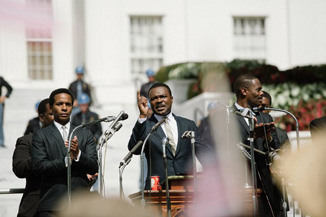The 400-Word-Review: Selma
By Sean Collier
January 7, 2015
The majority of historically-based films function effectively as one linear narrative.
Scratch that — historically-based films only occasionally work effectively as anything, but when they do, it’s usually as one linear narrative.
Straight biopics illuminate their subject through drama. Recreations of important moments in time bring the import and impact of history into the present. Allegorical, past-as-present stories draw out the lessons of the past.
Selma does all three.
Exquisitely directed by Ava DuVernay, Selma’s story concerns the fight for voting rights in 1965 in Alabama and the Dr. Martin Luther King-led march from Selma to Montgomery that preceded the passing of the 1965 Voting Rights Act.
As a look at King, interpreted in a landmark performance by David Oyelowo, it’s enlightening. King’s struggle to steadfastly lead an arduous fight while suppressing his own pain and uncertainty — not to mention maintaining some semblance of a family life — is heart-wrenching here. In speeches (paraphrased; King’s family retains the rights to his writings, and did not participate), the 20th century’s greatest orator is entrancing; in private moments, the man is more so.
As a telling of what happened that year in Alabama, it’s an incredible feat of storytelling. The script — by Paul Webb, a British writer and filmmaker on his first feature, and allegedly with considerable (uncredited) work by DuVernay — turns the historical reality into multifaceted high drama. Watching the well-removed white men in halls of power (including strong turns by Tom Wilkinson as Lyndon B. Johnson and Tim Roth as George Wallace) butt heads while civil rights leaders and students do the same in churches and schools creates the tension of a thriller when marches and demonstrations begin.
But on its most miraculous and vital level, Selma is an impossibly timely commentary on 2015 rather than 1965. When the film entered production, no one could have predicted that clashes between the police and the people would shape the national dialogue as the movie neared release. But watching scenes of militarized police violence against unarmed protesters — including the killing of Jimmie Lee Jackson — is uncannily chilling. If a film were made today about Ferguson, it wouldn’t be able to say more about modern racial politics than Selma does. That Selma is so timely is a remarkable accident; that it is a powerful and essential film is to the credit of a supremely talented cast and filmmaker.
My Rating: 10/10
Sean Collier is the Associate Editor of Pittsburgh Magazine and a member of the Broadcast Film Critics Association. Read more from Sean at pittsburghmagazine.com/afterdark




